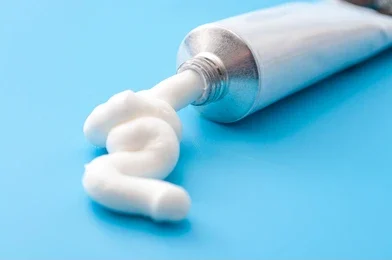Tretinoin is a topical retinoid derived from vitamin A that is commonly used in dermatology. It is most often prescribed to help manage acne by promoting faster skin cell turnover and preventing the formation of clogged pores.
In addition to acne, tretinoin is also used to improve the appearance of photoaged skin, including fine lines, uneven skin tone, and surface-level pigmentation issues caused by prolonged sun exposure. While tretinoin does not “cure” these concerns, it may contribute to visible improvement with consistent use under medical supervision.
This guide will help you understand how tretinoin works, its potential benefits, safe application practices, and possible side effects.

What is Tretinoin Cream?
Tretinoin cream is a topical prescription treatment commonly used in dermatology. It helps manage acne and improve the appearance of uneven skin texture and fine lines. The active ingredient, tretinoin, is a vitamin A derivative that works by increasing skin cell turnover. This process promotes the shedding of older skin cells and the emergence of fresher skin, which makes the cream effective for anti-ageing and acne treatment.
How Tretinoin Cream Works
Tretinoin promotes faster skin cell turnover, encouraging the shedding of older skin cells and the replacement with newer, healthier ones. This mechanism helps to manage acne by unclogging pores, which may reduce active breakouts and help prevent new ones from forming.
At the same time, it supports collagen synthesis, which can improve the appearance of fine lines and uneven skin texture over time. While not a cure, it is frequently used to manage signs of photoaging, such as pigmentation irregularities and surface roughness. With consistent, medically guided use, tretinoin can help even out skin tone and refine skin texture, contributing to healthier-looking skin.
Key Benefits of Tretinoin Cream
Tretinoin cream offers several clinically supported benefits for skin health, particularly in the management of acne, photoaging, and textural concerns:
- Acne Treatment: Tretinoin increases skin cell turnover, helping to prevent clogged pores and reduce the frequency and severity of acne outbreaks.
- Reduces Fine Lines and Wrinkles: It promotes collagen production and skin renewal, which may reduce the appearance of fine lines and wrinkles.
- Improves Skin Texture: It helps fade hyperpigmentation and evens out skin tone and texture.
- Enhances Skin Radiance: Tretinoin promotes exfoliation, leading to a fresher, more youthful appearance over time.
Recommended Dosage and Application
Tretinoin is a potent topical medication, so use it cautiously:
- Start gradually: Apply every other night initially, increasing frequency as your skin tolerates it.
- Use a small amount: A pea-sized quantity is sufficient; applying more will not improve results.
- Apply only at night: Tretinoin degrades in sunlight and can increase skin sensitivity to UV rays.
- Moisturize regularly: Helps minimize dryness and irritation often caused by tretinoin.
- Use sunscreen daily: Essential to protect skin from UV damage while using tretinoin.
- Strength varies: Doctors typically prescribe concentrations ranging from 0.025% to 0.1%, depending on individual skin needs.
Tretinoin helps manage acne and skin aging by promoting skin renewal and collagen production but does not cure underlying causes. Proper use supports skin improvement over time.
Tretinoin Cream Side Effects
Tretinoin is very effective, but it can cause some temporary side effects, especially during the first few weeks of use. These can include:
- Dry or peeling skin
- Redness and irritation
- A mild burning or stinging feeling
- Increased sensitivity to sunlight
These effects are generally mild and tend to decrease as your skin adjusts. If side effects become severe or persistent, consult your doctor.
Long-Term Considerations
With proper use under medical supervision, tretinoin is safe for long-term use. Consistency is important, though overuse can cause irritation without improving outcomes.
Who Should Avoid Tretinoin Cream?
Avoid using it if:
- You have skin conditions like eczema or sensitive skin, because tretinoin may cause significant irritation.
- You are pregnant or breastfeeding, unless advised by your doctor, as safety is not well-established.
- You are using other topical treatments that can increase skin irritation unless directed by your healthcare provider.
Tips for Using Tretinoin Cream Safely
- Moisturise generously to reduce dryness.
- Use gentle cleansers in place of harsh soaps.
- Do not combine with other strong actives (such as salicylic acid or benzoyl peroxide) unless advised.
- Be patient: results often take 8–12 weeks.
- Follow your routine.
Closing Thoughts
Tretinoin can be an effective treatment for acne and may help reduce the appearance of dark spots and fine lines caused by sun damage. While it may cause initial skin irritation and results can take several weeks to appear, consistent use can promote healthier, smoother skin. Thus, you must consult your dermatologist or doctor to determine if tretinoin is appropriate for your skin needs.
Medkart is here to help you find cheap, high-quality tretinoin cream or any other medicine that your doctor has prescribed. Why spend more on name-brand creams when generic ones work just as well?
FAQs
1. What should I do if I experience severe irritation from tretinoin cream?
If irritation is severe, reduce the frequency of use or pause application temporarily. Always consult your dermatologist before making any changes.
2. Can tretinoin cream be used daily?
Most doctors recommend using tretinoin cream once daily, at night. But how frequently you do it depends on your skin type and tolerance. So follow your dermatologist’s advice.
3. What are the common tretinoin cream side effects?
Mild redness, peeling, dryness, or a stinging sensation are common tretinoin cream side effects, especially in the first few weeks. These usually improve when your skin adjusts.
4. How long does it take to see results with tretinoin cream?
Results differ, but after 8–12 weeks of regular use, most people see a noticeable difference in their acne or skin texture. Patience and regular application are key.
5. Can tretinoin cream remove deep wrinkles permanently?
Tretinoin can improve fine lines and skin texture, but it does not permanently remove deep wrinkles. It is most effective as part of a long-term skincare routine.